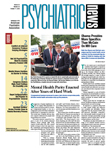A new law aims to restore the Americans With Disabilities Act (ADA) workplace protections for people with disabling illnesses, including psychiatric ones, that can be treated with medication.
The legislation (S 3406) to amend the ADA easily passed Congress and was signed into law by President George Bush in September. It reverses the effect of a series of Supreme Court decisions in recent years that limited the applicability of the original ADA (PL 101-336) to people for whom there are no effective medical treatments or prostheses.
The new law expands the definition of disability and makes it easier for workers to prove disability-based discrimination. It explicitly rejects the strict standards used by the Supreme Court to determine who is disabled.
The law states that the Court erred in four separate rulings over the 18 years since the original ADA law was enacted. Those rulings ran counter to Congress's original intent by eliminating safeguards for many of the people the ADA was designed to protect.
“As a result of these Supreme Court cases, lower courts have incorrectly found in individual cases that people with a range of substantially limiting impairments are not people with disabilities,” the new law points out.
The new law directs courts considering whether a person is disabled to rely not on the effects of “mitigating measures” like prescription drugs but on the degree of impairment he or she has resulting from an underlying medical condition. In addition, the law specifies that an impairment that is episodic or in remission is still a disability if it would substantially limit a major life activity when active.
Many people with mental illness have been denied protection under the ADA, according to mental health advocates, because their impairments are episodic.
The original ADA already protects people who have an impairment that“ substantially limits” a major life activity, who have a record of such impairment, or who are treated for having such an impairment. The new measure provides a revised definition of “disability” to clarify Congress's intent to apply a less-stringent standard than the one that has been used by the Supreme Court. The measure states that any condition that limits a single “major life activity” would constitute an impairment, instead of the tight court-established definition of conditions that limit all such activities.
The recently enacted measure is a narrower version of legislation introduced in July 2007. That bill drew widespread opposition from business groups. One of them, the U.S. Chamber of Commerce, supported the original ADA law, seeing it as likely to be less costly to businesses. After five months of negotiations, disability-rights advocates and business leaders reached a compromise in June.
“We hope soon to see the ADA as again a strong tool to help people with mental illnesses secure the protections they need to participate fully in society,” said Jennifer Mathis, deputy legal director of the Bazelon Center for Mental Health Law, who participated in the ADA compromise negotiations.
The measure comes as disability-rights advocates point out that employment rates for people with disabilities have not increased over the past 18 years, and about 70 percent of people with severe disabilities remain unemployed.
The ADA clarification can be accessed at<http://thomas.loc.gov> by searching on the bill number, S 3406. ▪
